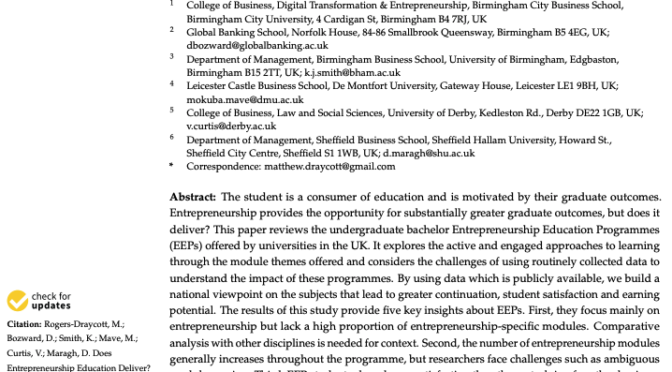Title: Reimagining the University-Industry Partnership: A New Model for Impact
There’s a certain quaintness to the traditional image of university-industry partnerships. Think career fairs, bake sales to fund student projects, perhaps a guest lecture from an industry leader. These are valuable initiatives, certainly, but they often feel like peripheral activities – a polite nod towards the ‘real world’ rather than a fundamental shift in how universities operate.
I’m not dismissing these efforts, mind you. I’ve participated in them myself, organizing career workshops and facilitating industry mentorship programmes. But after years of observing these interactions from both sides – as an academic deeply invested in research and a consultant advising businesses – I’m convinced that we need to fundamentally reimagine the university-industry partnership. We need a model that moves beyond simple transactional exchanges and embraces genuine collaboration, one that prioritizes shared value creation over short-term gains.
I’m not suggesting a radical overhaul, but rather a subtle recalibration – a shift in mindset that recognizes the inherent strengths of both institutions and leverages them to address complex societal challenges. It’s a vision born from witnessing firsthand the frustrating disconnect between academic research and real-world application, and fueled by a deep conviction that universities have a crucial role to play in driving innovation, productivity and economic growth.
The Current Landscape: A History of Missed Opportunities
Let’s be honest, the current landscape is often characterized by a degree of mutual skepticism. Universities are perceived as ivory towers, disconnected from the practical needs of businesses. Businesses, in turn, view universities as slow-moving bureaucracies, resistant to change and unwilling to commercialize their research.
This isn’t entirely unwarranted. The traditional model often prioritizes academic publications over practical impact, incentivizing researchers to publish in high-impact (don’t get me started on those) journals rather than seeking solutions to today’s real-world problems. The intellectual property landscape can be a minefield, with complex licensing agreements and conflicting interests hindering commercialization efforts. And let’s not forget the inherent cultural differences – the academic emphasis on rigorous peer review clashes with the business imperative for rapid iteration and market validation.
I recall one particularly frustrating experience advising a medtech startup that was struggling to secure funding for a promising new intervention. The university’s technology transfer office, while well-intentioned, was bogged down in lengthy negotiations with potential investors, delaying the project and ultimately jeopardizing its future. It was a stark reminder that good intentions alone aren’t enough; we need streamlined processes, clear incentives, and a shared commitment to driving impact.
A New Model: Shared Value Creation at the Core, Grounded in Experiential Learning
My vision for a reimagined university-industry partnership centres on the concept of shared value creation (The central premise of enterprise creation). It’s about moving beyond transactional exchanges and fostering deep, collaborative relationships that benefit both institutions and society as a whole. Crucially, this requires embedding experiential learning at the heart of our approach. Tools like SimVenture, for instance, offer unparalleled opportunities for students to grapple with real-world business challenges in a safe and engaging environment. Imagine undergraduate teams developing strategic plans for simulated companies, making investment decisions, navigating market fluctuations – all while receiving mentorship from industry professionals. This isn’s just theoretical learning; it’s applied knowledge, forged in the crucible of simulated experience.
Key Pillars of a Collaborative Future:
Here are some concrete steps we can take to build this collaborative future:
- Embedded Industry Fellows: Imagine a programme where experienced industry professionals are embedded at the same level, within university departments, working alongside faculty and students on real-world projects. These fellows would bring valuable insights into market needs, provide mentorship to aspiring entrepreneurs, and help bridge the gap between academic research and commercial application.
- Challenge-Driven Research: Instead of pursuing research topics in isolation, universities should actively solicit challenges from businesses and policymakers. This would ensure that our research is aligned with real-world needs, increasing its relevance and impact.
- Flexible Intellectual Property Frameworks: We need to move away from rigid, one-size-fits-all intellectual property frameworks and embrace more flexible models that encourage collaboration and innovation.
- Cross-Disciplinary Innovation Hubs: Universities should establish cross-disciplinary innovation hubs that bring together faculty, students, and industry partners from diverse fields to tackle complex challenges.
- Data-Driven Impact Assessment: We need to develop robust data-driven impact assessment frameworks that measure the real-world benefits of our research.
- Robust Subcontractual Oversight: Recognizing that complex projects often involve subcontracting, universities must implement rigorous oversight mechanisms. As detailed in my work on this topic, clear contractual provisions, independent audits, and transparent reporting are essential to ensure accountability, mitigate risks, and safeguard the integrity of collaborative ventures. This includes establishing clear lines of responsibility for performance, quality control, and ethical conduct across all tiers of the project.
The Role of Policy: Incentivizing Collaboration
Government policy also has a crucial role to play in incentivizing collaboration between universities and businesses. This could involve providing tax breaks for companies that invest in university research, creating grant programmes that specifically target collaborative projects, and streamlining regulatory processes to facilitate commercialization.
I remember advocating for a policy change in my own state that provided tax credits to companies that partnered with universities on research projects. The impact was immediate – we saw a surge in collaborative initiatives, leading to the creation of new businesses and high-paying jobs.
Embracing Imperfection: A Journey, Not a Destination
This isn’t about creating a utopian vision of perfect collaboration. It’s about acknowledging that the journey will be fraught with challenges, setbacks, and disagreements. There will be times when we stumble, make mistakes, and question our assumptions. But it’s through these experiences that we learn, adapt, and ultimately build a more effective partnership.
As I reflect on my own experiences, I’m filled with a sense of optimism and hope. I believe that universities have a vital role to play in driving innovation, creating jobs, and addressing some of the world’s most pressing challenges. And I believe that by reimagining our partnerships with businesses, incorporating experiential learning tools like SimVentures and implementing robust subcontractual oversight, we can unlock a new era of shared value creation and lasting impact.





